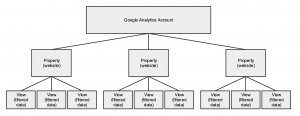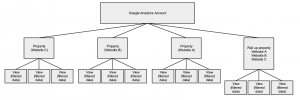

Get started with Roll-up Reporting
Do you have multiple domains (or subdomains) which you would like to track collectively in Google Analytics (GA)? Constantly switching tabs between different GA views or downloading data for manual comparisons in Excel? Your answer is Roll-up Reporting – the solution for cross-domain tracking.
How to use roll-up reporting
Here is what you can use Roll-up reporting for, why you would need to use and how to implement it…
A data “roll-up” is defined as creating “averages of an average”, where data is aggregated from multiple sources into one overall view.
Google currently promotes roll-up reporting as a Premium GA account feature, however, it is entirely possible to create a setup which does the same job using free GA accounts, this is also known as “parallel tracking” or “standard roll-up tracking”.
The standard GA setup commonly implemented is where a property script (Using an I.D. like “UA-123456-1”) is added to a single website, which then populates your GA account with the user data for that particular website, enabling reporting such as traffic by channel, on-site behaviour and conversions, etc.
However, it is often the case that the same property I.D. has been added to multiple websites (such as the eCommerce site, blog, etc) and the data shown in GA is for multiple domains, which in theory is a basic implementation of parallel tracking. However, without an advanced configuration of this, your site data can be skewed which will often lead to incorrect reporting.
This is how a standard Google Analytics account and tagging implementation setup looks…

However, the setup of data from multiple websites being combined would look like this…

Combining user data from multiple sources into one single view can have a number of benefits for different parties…
For agencies, this can help with:
Identifying common issues across websites with a similar audience or product type.
Defining what areas of your websites work well between different audience types.
Giving a “bird's eye” view of all conversions being generated by their clients’ digital activity, this could also include GA data from app usage to complete the picture.
For companies with multiple brands, this can help with:
Highlighting similar behaviour patterns and on-site activity.
Tracking journeys between domains.
Finding top-selling products and seasonal trends between brands.
For companies looking for a “bird's eye” view of their full online business:
Total traffic numbers in real-time and top pages being viewed at that exact moment.
Total revenue generated & deeper eCommerce stats.
Demographic data for their entire online audience.
These benefits are extremely important to any business, and a roll-up account should always be the first place to check when looking for a top-level overview or attempting to highlight a foreseen issue.
Limitations of roll-up reporting
Although the benefits are clear, there are also limitations of this implementation of roll-up reporting – the main drawbacks being:
If some of the sites you wish to report on in the roll-up have over 10 million hits per property per month you may be required to upgrade to a premium GA account or implement data sampling.
A discrepancy can occur when users initiate a direct session after a campaign session, this is resolved when the source property’s campaign has timed out and the direct sessions are subsequently attributed to campaigns created after the roll-up property was created.
Deduplication of unique visitors between domains cannot be achieved.
Source property dimensions are not available on Standard GA accounts.
The setup and firing of tags will become more complex.
You cannot share any imported data that has been loaded into your GA property.
Why choose Remarkable Commerce?
If you’re unsure of where to begin with implementing or optimising your Google Analytics properties, our knowledgeable team are here to guide you every step of the way.
Visit our website and get in touch with us today!